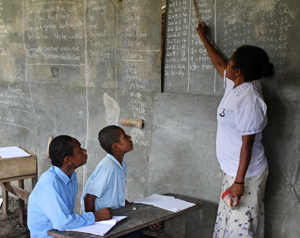Literacy is essential for overcoming poverty, reducing child mortality, achieving gender equality and sustainable development. September 8, International Literacy Day, focuses attention on worldwide literacy issues.
Literacy is at the heart of basic education for all. Literate people are better able to access healthcare, employment and higher education opportunities. Literate parents are more likely to send their children to school and literate societies are more stable, democratic and prosperous.
The United Nations Educational, Scientific and Cultural Organization (UNESCO) estimates that worldwide, 131 million young people aged 15-24 lack basic reading and writing skills, often due to the poor quality of schooling.
Australia recognises that a good quality basic education equips pupils with literacy skills for life and further learning.
Youth literacy rates vary widely across Asia and the Pacific, from 99 per cent in Samoa, 64 per cent in PNG, to just 34 per cent in Afghanistan.
In response, Australia is working with governments and communities to build schools, improve the quantity and quality of teachers, strengthen curriculum materials, and reduce the burden of school fees on poor families.
In 2010-11 Australia's investment in education is expected to be over $744 million, or 19 per cent of total Official Development Assistance.
Australia's aid program is making a difference. In Papua New Guinea, Australia's support has helped increase primary school enrolment from 54 per cent to 63 per cent over the last three years.
Australia has also helped to train 33,000 teachers in Papua New Guinea, and has provided more than 530,000 new textbooks for primary schools and teacher training colleges. Textbooks are crucial resources, especially for rural and remote schools where learning materials are scarce.
International Literacy Day has been commemorated since 1966.

